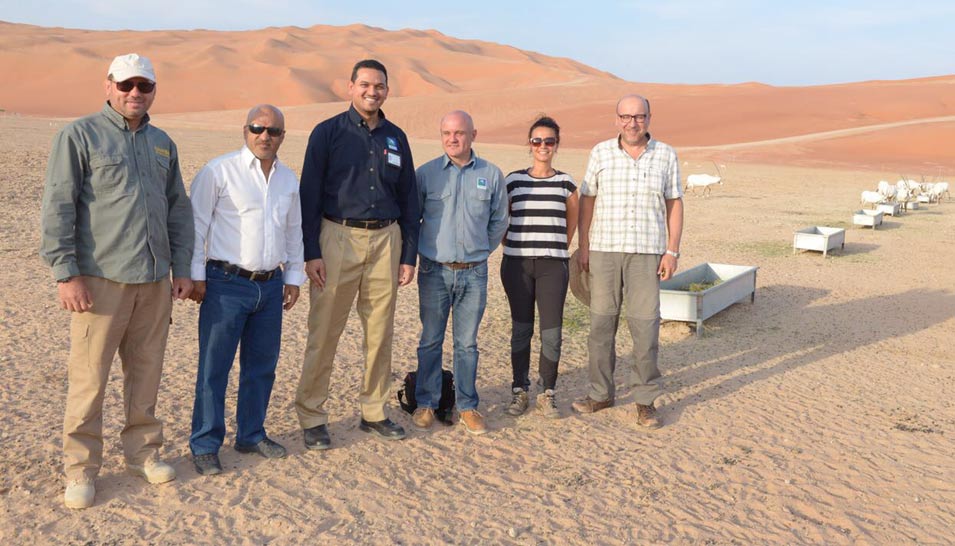



Shaybah Producing Department (SyPD) and King Abdullah University of Science and Technology (KAUST) initiate a pioneering ecological research project at Shaybah Wildlife Sanctuary
by Wayne Sweeting – Shaybah Producing Dept.
Shaybah — In line with Shaybah Producing Department strategy to establish partnerships with elite academic institutions, Professor Daniele Daffonchio and research scientist Dr. Ramona Marasco of King Abdullah University of Science and Technology (KAUST) spent three days in Shaybah undertaking deep desert ecological fieldwork. This formally commences the collaborative biodiversity research within Saudi Aramco’s newly created Shaybah Wildlife Sanctuary (SWS).

Deep within the Rub’ al-Khali (Empty Quarter) desert, unusual plant species grow that seem to defy all logic. Despite a summer heat of 50 degrees, no irrigation, near zero rainfall, and a lack of organic material in the desert sands, a few unique plant species have found a way to survive, where all other plants cannot.
“How is this possible? What specialized properties do these plants possess? Why do they grow in some areas of the Rub’ al-Khali, but are absent in others? To safeguard and increase the numbers of these rare species inside the SWS, questions such as these will need to be answered,” explains Wayne Sweeting, SWS, Scientific and Operations Coordinator.
“KAUST and Saudi Aramco have a well-established and enduring relationship. Indeed, Saudi Aramco managed the design and construction of KAUST. As a result, we are fully aware of the technical capability and expertise they possess. As soon as we were ready to commence ecological research in the sanctuary as part of Shaybah Environmental stewardship, KAUST was naturally our first point of call. We look forward to collaboratively working on biodiversity research projects and jointly publishing the results in the future to protect and further improve the fragile environment around us” says Samer Al-Abduljabbar, Superintendent, Shaybah Producing Operations Division.
Professor Daffonchio leads the Extreme Systems Microbiology Lab (ESM Lab) within KAUST that investigates soil microbial ecology in extreme arid environments. His current projects include studies in the Sahara and Namib deserts. He proposes that a key factor to the plant’s survivorship in the Empty Quarter may actually be due to the tiniest of creatures, including bacteria, fungi and other micro-sized lifeforms, which form a microbial community inhabiting the golden desert sands.

A Shaybah Wildlife Sanctuary
ranger exposes the delicate
root system of spear grass to
enable sampling.
“Take spear grass, a common plant found across the sanctuary, as an example. The plant has a special aboveground leaf architecture, which captures morning dew from the air and funnels it down to the underground root system. Living on the moist plant roots is a jelly-like microbial mass. In return for the moisture delivered by the host plant, it appears the microbial lifeforms produce and provide the plant with all the nutrients and other requirements it needs to survive,” said Professor Daffonchio.
KAUST researchers and the SWS rangers installed a suite of underground probes, which will log temperature and other environmental parameters for six months to characterize and compare soil conditions in areas comprising sand dunes and salt flats (sabkhas). Additionally, a number of soil, root and vegetation samples were collected. These will be analyzed in the KAUST ESM Lab in Thuwal to identify and describe the microbial lifeforms present inside the SWS for the first time.

Samer Al-Abduljabbar,
Operations Superintendent,
Shaybah Producing Dept.
Sweeting explains that ecological and biodiversity research was identified as a key SWS output from the project’s inception. “The information generated from research of this type will not only help form the SWS management strategy, which will be based on ecological data and principles, but will deepen the understanding of how desert ecosystems operate generally. The results can therefore educate and guide other desert conservation projects worldwide. As a result, the net environmental benefit emanating from the project expands well beyond the sanctuary’s 636 km2 borders.
It is anticipated that a number of internal and external technical research and collaborations with additional academic institutions will be initiated inside the SWS over the coming years to further understand the ecosystem in Shaybah desert and help in protecting the fragile environment in this area.



From left to right: Professor Daffonchio; research scientist Dr. Ramona Marasco; Samer Al-Abduljabbar; Wayne Sweeting and sanctuary ranger Hashim Al Dairi take microbiological samples from the roots of a desert shrub.